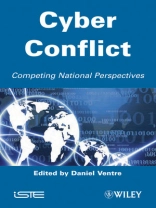Today, cyber security, cyber defense, information warfare and
cyber warfare issues are among the most relevant topics both at the
national and international level. All the major states of the world
are facing cyber threats and trying to understand how cyberspace
could be used to increase power.
Through an empirical, conceptual and theoretical approach, Cyber
Conflict has been written by researchers and experts in the fields
of cyber security, cyber defense and information warfare. It aims
to analyze the processes of information warfare and cyber warfare
through historical, operational and strategic perspectives of cyber
attack. It is original in its delivery because of its
multidisciplinary approach within an international framework, with
studies dedicated to different states – Canada, Cuba, France,
Greece, Italy, Japan, Singapore, Slovenia and South Africa –
describing the state’s application of information warfare
principles both in terms of global development and
‘local’ usage and examples.
Contents
1. Canada’s Cyber Security Policy: a Tortuous Path Toward
a Cyber Security Strategy, Hugo Loiseau and Lina Lemay.
2. Cuba: Towards an Active Cyber-defense, Daniel Ventre.
3. French Perspectives on Cyber-conflict, Daniel Ventre.
4. Digital Sparta: Information Operations and Cyber-warfare in
Greece, Joseph Fitsanakis.
5. Moving Toward an Italian Cyber Defense and Security Strategy,
Stefania Ducci.
6. Cyberspace in Japan’s New Defense Strategy, Daniel
Ventre.
7. Singapore’s Encounter with Information Warfare: Filtering
Electronic Globalization and Military Enhancements, Alan
Chong.
8. A Slovenian Perspective on Cyber Warfare, Gorazd Praprotnik,
Iztok Podbregar, Igor Bernik and Bojan Ticar.
9. A South African Perspective on Information Warfare and Cyber
Warfare, Brett van Niekerk and Manoj Maharaj.
10. Conclusion, Daniel Ventre
Over de auteur
Daniel Ventre is Engineer, CNRS. Researcher at CESDIP laboratory/Invited Professor at ESSEC Business School Paris/Invited Professor at Telecom Paris Tech, France.












